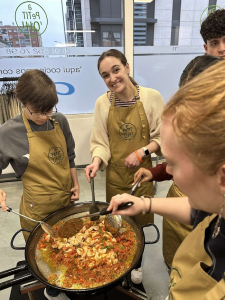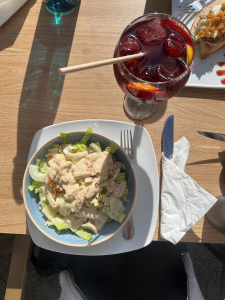“Best Culture” – Conversation and Connections
The task of this blog entry is different from the previous ones. Instead of talking about my cultural experience, the main point of this assignment is to dive deeper into another culture. (And yes, the title is a direct quote from this interview.) I chose my friend Kamil, who lives in Madrid. He was born in Maryland and lived in the US for a few years while he was young and then again for high school. He also lived in Morocco for a time. Because of his experience with many cultures, I asked him to be my interviewee for this cultural conversation.
Family and education: Kamil’s parents are doctors, and he’s following suit by attending medical school here in Madrid. He reflected that his family passed down several values to him as he grew up. The first is working hard. Those who sit back and relax, waiting for good things to come to them, will scarcely get far in life. They taught him to have self-worth and dignity. Concerning others, he was taught to be empathetic and to do good to those around him. Overall, these are common and positive values for children of all cultures. Education-wise, he was able to attend private schools, even in international settings. He then did some Spanish schooling to get his baccalaureate, allowing Spanish students to attend university. Overall, he considered his experience good, as it provided him with opportunities to explore things and learn new languages. It also allowed him to focus on the solid areas and improve on the weak ones. He selected schools that help to create a work setting that is appropriate for each person. But like his parents taught him, he still has to work to succeed. There are a few logistical differences between schooling in Spain and America, but I think that overall, the goal is for schools to provide options for students to select courses that will allow them to learn about the topics that interest them and will benefit them in their futures.
Religion and gender roles: Statistically, the majority of Spain is Catholic, but the percentage of those who practice the religion (going to mass, etc.) is much lower. Kamil was primarily raised in Christianity, as that is his mom’s religion, but he also had some Jewish influence from his dad. Religion isn’t a massive aspect of people’s lives in Spain, which I think is similar to most of those in America. Gender roles also aren’t a huge deal, as they’re pretty equal. Just looking at their government, as Kamil pointed out, many high positions are filled by women. In his university, the majority of medical students are female. American culture is getting to the point of having gender equality, but the media shows that we still have a little way to go.
Stereotypes: This was one of my favorite sections to interview Kamil about, but he said it’s up to me to decide whether or not they’re true. He says that people think that the Spanish “are loud, lazy, like to party, short, Royalists, love futbol, and dress well.” And honestly, I agree with many of these. They’re pretty loud when they’re comfortable and are willing to voice their opinions, but there are many Americans who are the same (think of Karens). The laziness stereotype comes from their siesta (nap) culture, but I think that’s just to get them through their late nights, as they tend to be party people. This is mainly for the younger generation, those in their late teens, 20s, and 30s, but I think many people in this age range tend to go out at night. Americans do this, too, but (legally) it starts at an older age and typically ends earlier in the night, in my opinion. As I’ve mentioned, the Spanish dress well, especially in comparison to Americans. They do love their futbol (soccer) teams, kind of like Americans have their specific football or baseball team they support. Generally, Spaniards are shorter, but it’s hard to compare them to Americans because of the diversity of nationalities. I also asked Kamil about stereotypes that Spaniards have about Americans. Immediately he said that we don’t know geography or the metric system. Unfortunately, I couldn’t argue with either of these. Overall, we are very content with knowing the geography of the United States (only) and the imperial system.
Food and holidays: Spain has several typical cultural foods. The ones Kamil names are “paella, bacaloa (cod fish), patatas bravas (potatos with spicy sauce), jamon serano (ham cooked a certain way), tortilla de patata (potato cake dish), pan con tomate (bread with tomato), mejillones (mussels), and vino rojo (red wine), especially in sangria and tinto de verano.” Food especially plays a significant role in holiday celebrations. The two most important holidays are Christmas (along with the 3 reyes/kings) and the Semana Santa (Holy Week and Easter), the same in the US. At Christmastime, Spaniards typically have family time, go to church, share food, and do charitable work, similar to Americans. Easter is celebrated similarly, but many large processions and parades can be a learning experience for those who observe them during the week. These processions are like nothing I’ve seen in the States, but they may be on more minor scales.
The final question I asked was this: “What is the most important thing I should know about your culture?” Kamil’s response is what the title of this post is: “best culture.” And after living in it for these past two months, I can attest that it really is an amazing culture to be a part of.
Link to a video of me flipping a tortilla de patatas

Making paella

A glass of sangria with lunch

Religious paintings

The interviewee Kamil
